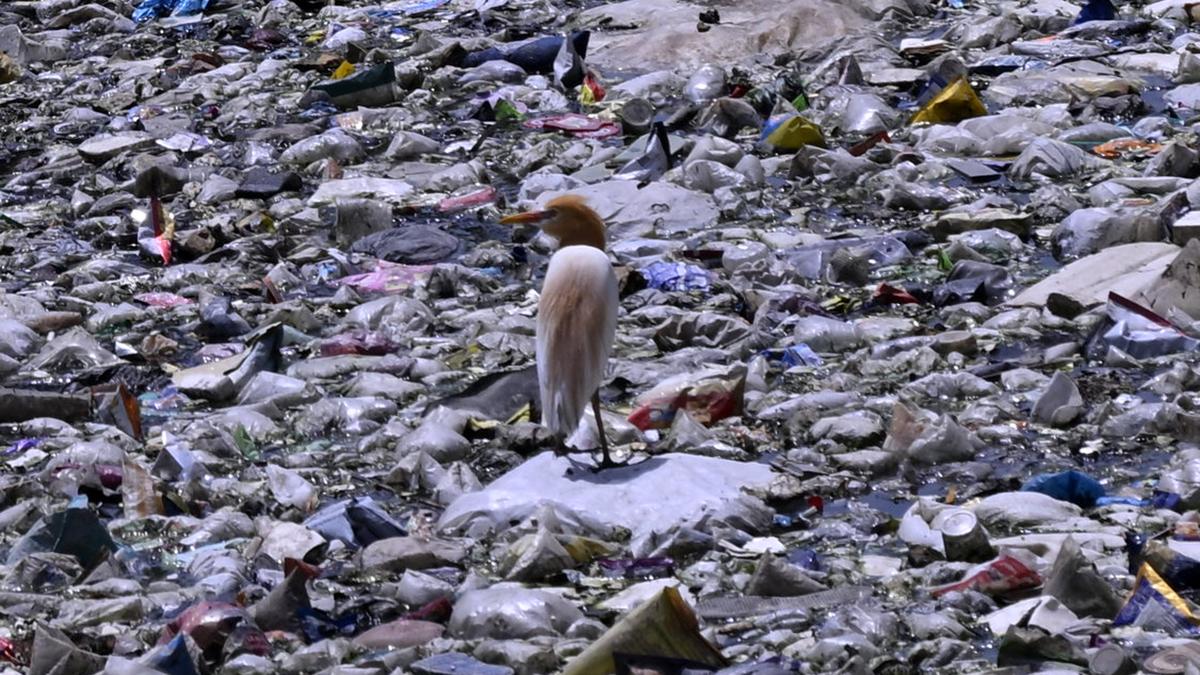
The theme for this year’s World Environment Day was ‘Beat Plastic Pollution’, a problem which the United Nations estimates costs between $300 billion and $600 billion annually but is perhaps also one of the most fixable environmental challenges we face.
| Photo Credit: Shiv Kumar Pushpakar
World Environment Day was celebrated on June 5. It was a moment to reflect on the fragility of our planet and how collective action can help protect it. The theme for this year’s day was ‘Beat Plastic Pollution’, a problem which the United Nations estimates costs between $300 billion and $600 billion annually but is perhaps also one of the most fixable environmental challenges we face. More than 400 million tonnes of plastic are produced every year worldwide, and less than 10% is recycled. An estimated 11 million tonnes end up in lakes, rivers, and seas annually. Microplastics find their way into food, water, and air. We must continue to increase levels of recycling, but the simplest way to tackle the issue is to try and avoid single-use plastics.
Last year, I began exploring a related challenge: Could Bengaluru’s consumers reduce their reliance on bottled drinking water if they had greater confidence in the quality of alternative sources? The idea for this project came one morning when, while driving to a meeting, I realised that my water bottle was empty and that I would struggle to fill it up anywhere without making a detour. I began to think how, in a city which was once known for its lakes, it can sometimes seem disproportionately difficult to access safe drinking water outside the house without resorting to a plastic bottle.
Around the world, bottled water consumption continues to grow rapidly. According to a UN University report, bottled water sales have now surpassed half a trillion litres annually, driven in large part by concerns around water safety and the reliability of alternatives. Yet with this convenience comes a cost: the environmental burden of single-use plastic. Having begun to dig into this field, and reflecting on the incredible talent which calls Bengaluru home, I started considering whether there was a way in which technology could help address this problem.
The U.K.-India relationship can be based on mutual interest. We can learn from each other, especially on climate and sustainable development. The U.K. is working with India in providing expertise through programming; partnering with India on science and technology; providing support on climate finance; and collaborating on initiatives on renewables, green power connectivity, and adaptation.
Over the past six months, the U.K. has partnered with the Ashoka Trust for Research in Ecology and the Environment to better understand this issue, specifically in Bengaluru. Focusing initially on water sources in restaurants and through consumer research and testing, we now have a body of evidence that confirms that some consumers choose bottled water because of the uncertainty around the quality of other sources. Our research has highlighted how, if consumers had access to reliable data about water quality, many would feel more confident choosing alternatives to bottled water. Consumer fears around the quality and consequences of drinking non-bottled are justified, as many water samples tested during this research fell short of the standards for safe drinking water.
So what does this mean? We know that around the world, plastic has both an environmental and social cost — we see it on our streets and even in wild spaces such as our national parks. We routinely drink filtered water at home because we are confident that the system is being effectively maintained. We know that drinking sufficient water and staying hydrated is essential to maintaining our long-term health and we are witnessing how the manufacturers of filters systems, designed to clean water at the point of use, are increasingly using technological solutions to allow consumers to track their water consumption; and provide data on when their filters should be serviced.
Making this same information available outside the home — for example, by communicating the maintenance status of filters and displaying it in restaurants, malls, or offices — would help ensure consumers have peace of mind when drinking filtered water. By bridging this gap in trust, Bengaluru, which is renowned for innovation, could lead the way in reducing our dependence on plastic. In doing so, we would not only ease the burden of plastic waste but also set an example of how local solutions can feed into global progress.
James Godber is the Deputy Head of Mission at the British Deputy High Commission, Bengaluru
Published – June 17, 2025 12:15 am IST
